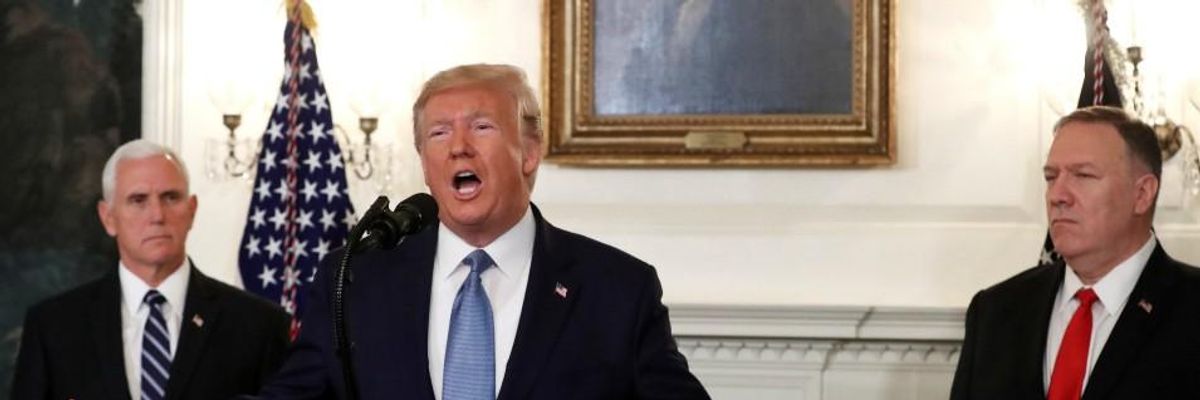The Trump administration has sounded the death knell for humanitarian trade with Iran. By designating Iran a jurisdiction of primary money laundering concern and imposing additional restrictions on foreign banks maintaining accounts for Iranian financial institutions, the United States Department of the Treasury has imposed a prohibitive bar for parties seeking to facilitate humanitarian trade with Iran--one that will further put the squeeze on the Iranian people and limit their access to food and critical medicines.
By designating Iran a jurisdiction of primary money laundering concern, Treasury finalized a rule requiring U.S. banks to conduct "special due diligence" on accounts maintained on behalf of foreign banks if those foreign banks themselves maintain accounts for Iranian financial institutions. The practical consequence is that U.S. banks will urge their foreign correspondents to terminate any accounts maintained on behalf of Iranian banks so as to eliminate sanctions risk and mitigate the need to apply additional resources to monitor their foreign correspondents. This will further sever Iran from the global financial system, as Iran's few non-designated banks find it increasingly difficult to maintain accounts abroad.
Absent the maintenance of accounts at foreign banks, Iran's financial institutions will prove increasingly unable to facilitate humanitarian-related transactions, including in food and medicine. This will compound a problem first exacerbated by the Office of Foreign Asset Control's (OFAC) recent designation of Iran's central bank. The designation of Iran's central bank made it sanctionable for foreign banks to facilitate humanitarian trade with Iran if the Central Bank of Iran was involved. Because Iran's central bank maintains Iran's stock of foreign currency and because cross-border trade in humanitarian goods requires Iranian importers to pay the foreign exporter in a designated foreign currency, OFAC's designation of Iran's central bank created a serious problem as to how Iranian importers would pay for the import of humanitarian goods into the country. OFAC's failure to exempt humanitarian trade from U.S. sanctions or provide guidance as to this matter in the weeks since the designation provided clear signal that the Trump administration is little concerned about the issue.
Now, Treasury's designation of Iran as a primary jurisdiction of money laundering will make it increasingly difficult for Iranian banks to maintain what limited overseas accounts remain available to it. If foreign banks shutter the remaining correspondent accounts held on behalf of Iranian financial institutions, Iran will have no effective mechanism by which to make payment for the import of humanitarian goods such as food and medicine. Treasury will have cut off both the channel by which Iran undertakes humanitarian trade (i.e., the central bank of Iran's foreign currency reserves) and through which Iran undertakes humanitarian trade (i.e., Iranian banks' overseas accounts).
To save face, the Trump administration simultaneously announced the creation of a so-called "humanitarian mechanism" through which foreign banks could facilitate humanitarian trade with Iran and receive assurance that such trade would not be sanctionable. Yet, this "mechanism" is no mechanism at all: Treasury is merely requiring that--if foreign banks wish to receive written assurance that they will not be subject to sanctions--they must provide Treasury with far-reaching monthly reports regarding their Iran-related transactions. Instead of providing a financial channel, new licenses or authorizations, or clear interpretive guidance as to how parties may lawfully conduct humanitarian trade with Iran, Treasury has created an information-collection vehicle whose effect--if not purpose--is fundamentally to dissuade foreign banks from partaking in humanitarian transactions with Iranian parties at all. Because, even though foreign banks need not use the so-called "humanitarian mechanism" to permissibly facilitate humanitarian trade with Iran, its promulgation signals to foreign banks that any humanitarian-related transactions conducted outside of this newly-prescribed channel may incur significant sanctions risk.
This action--considered in tandem with the recent designation of Iran's central bank--provides clear and convincing evidence that the Trump administration is deliberately targeting humanitarian trade with Iran as part and parcel of its so-called "maximum pressure" strategy. The Iranian people are no longer collateral damage to the Trump administration's economic war against Iran, but are increasingly in this administration's crosshairs. As Trump's "maximum pressure" strategy continues to fail to pay the hoped-for dividends, hawks in the Trump administration will continue to resort to the ugliest of tactics--including targeting humanitarian trade--in order to provoke Iran into a conflict with the United States.

